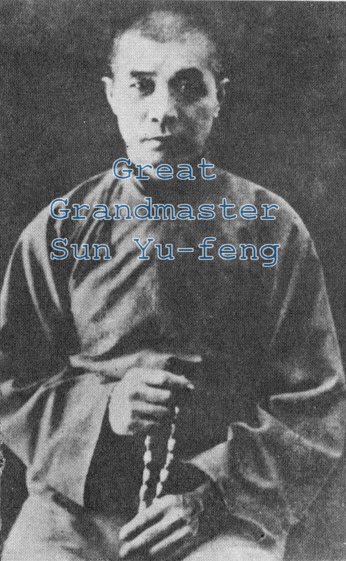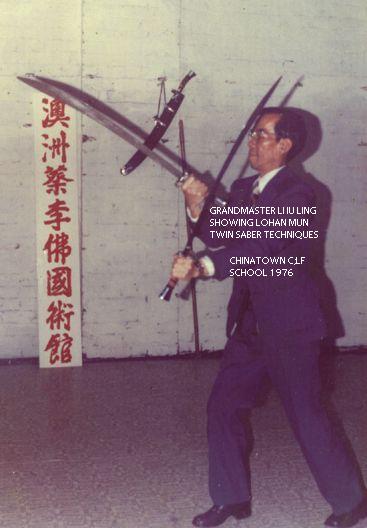羅漢門“五省刀王”孫玉峰
Sun Yu-feng (孫玉峰) was a native of Shantung Province, a north-eastern province with a rich martial art heritage. Through a combination of the forces of nature causing numerous floods and other hardships, as well as successions of wars, Shantung’s history was particularly colourful, producing many great northern kung fu masters, warlords, revolutionaries and bandits over the centuries. Indeed, the setting of famous martial art novel “108 Heroes of The Marshes” was in Liangshan, Shantung Province.
Born into a poor peasant family, Sun Yu-feng was known for his prodigious strength and was powerfully built. Together with his siblings he worked in the fields to help their parents. As they could not afford a buffalo to plough the fields, Sun Yu-feng would drag the plough himself like a buffalo while his brothers would push and direct the plough.
At a very young age, Sun Yu-feng enjoyed learning wrestling which was popular in Northern China both as a sport and a martial art. Being of very large build and possessing a natural aptitude for martial arts, the young SunYu-feng became very proficient in wresting and won many local contests.
When he was in his early teens, Sun Yu-feng travelled to Beijing to look for work and hoped to find someone who would teach him quan fa (fist skills). In Beijing, Sun Yu-feng met a Shaolin master by the name of Yuan Dong Zhan, who specialised in Lohan Quan.
Lohan Quan was noted for its powerful long hand techniques and chin na techniques. This style of kung fu was especially suited to a person of Sun Yu-feng’s build and he flourished under the tutelage of Yuan Dong Zhan. Sun Yu-feng continued to learn Lohan Quan under Yuan Dong Zhan for several years in Beijing.
Sun Yu-feng was barely sixteen years old when he joined the Zhen Wei Biao Ju, a security escort company. The life of a security escort in those days was fraught with danger. Over long journeys by horse back through rugged terrain and areas controlled by bandits, those who worked as security escorts have to be good fighters. The success of a security escort business depended more often than not, the reputation of the chief of the escort bureau. A fierce reputation as a top-notch fighter is the foremost quality required as a deterrent for would-be trouble makers. It was equally important to have friends in all the far corners of the country. A reputation as a righteous master respected by influential people on either side of the law was pre-requisite to be head of a security escort convoy.
During this period while working in the security escort industry, Sun Yu-feng learnt of a famous broadsword specialist by the name of Da Dao Zhang Jien Hui (Broadsword King Zhang) who was in turn the disciple of the legendary Da Dao Ma Xiang. Ma Xiang was an enigmatic character as not much was documented about his life. He was one of those legendary figures of Chinese martial arts but at the same time not famous in a mainstream sense because he did not establish a martial art style or school. His life bordered on fighting for justice for the poor and being an outlaw. It was said at that time, there were two giants in the world of Chinese martial arts: the Southern Bull and the Northern Horse. In the South, there was Huang Niu; in the North you have Ma Xiang.
Sun Yu-feng sought out Da Dao Zhang Jien Hui, who was the head of another security escort group called the Xing Lung Biao Ju (Prosperous Dragon Security Escort) and begged to be his student and at the same time serve in his security convoy.
SunYu-feng soon proved himself in the many dangerous journeys escorting convoys of precious goods throughout China. Da Dao Zhang Jien Hui, later accepted Sun Yu-feng as his disciple and taught him the exquisite broadsword skills passed down by Ma Xiang.
When Zhang Jien Hui retired, the security escort business was handed over to Sun Yu-feng as Zhang did not have an heir. In his travels throughout China as head of the security escort convoy, Sun Yu-feng’s reputation became known to all kung fu masters and bandit chiefs alike. His fierce mastery of the northern broadsword earned him the moniker “Broadsword King of The Five Provinces” (五省刀王).
It was common in China in those days for close friends in the martial arts world to become sworn blood brothers. Sun Yu-feng was a member of the brotherhood of The Thirteen “Feng’s” or Thirteen Peaks (十三峰). He was called the Seventh Master. Each of the thirteen brothers had a last name called “Feng” and each was a master of the highest calibre, specializing in his own particular style or weapon. The first of the thirteen sworn blood brothers was Yu I-feng (Yu the First Peak) , whose martial art was said to border on the realms of the supernatural. He would defeat his opponents even before they fought because his eyes would emit a cold, frightening glare that struck pure fear into the hearts of ordinary men. Another of the Thirteen Feng’s was Zhou Hai-feng who mastered the art of qing gung (weightless kung fu); witnesses claimed that he could run along the walls of buildings.
After the death of Huo Yuan-jia in 1910, the newly established Chin Wu Athletic Association in Shanghai was in desperate need to regain the initiative to carry on Huo’s dream of establishing physical education centres throughout China to encourage young people to be healthy and strong. The Chin Wu Athletic Association invited the top martial artists in Northern China to teach there. As the momentum gathered, the association spread to other parts of the country with a new branch in Canton (Guangzhou) to be opened. The support of four top masters was enlisted: Sun Yu-feng of Lohan Mern, Chen Zi-zeng of Eagle Claw , Luo Guang-yu of Praying Mantis and Yan Yuan-shan of the Six Harmonies Fist.
On their arrival in Guangzhou (Canton), the southerners respectfully referred to them as the Four Northern Tigers. Sun Yu-feng was assisted by his only son, Sun Wen-yong. During this time, not a few southern kung fu men came to test the skills of the new comers. As some of these tests of skill were actually challenges in those days, anyone wishing to open a new kung fu school either had to be a top notch master or had extensive patronage and support in the community. As a northerner, Sun Yu-feng had to accept these challenges and before long had established himself firmly in Guangzhou.
Sun Yu-feng later left the Chin Wu Athletic Association to form his own kung fu school called Chiang Hua Athletic Association (Strong Chinese Athletic Association). One of his most noted recruits was Huang Xiao He who had earlier learnt Choy Lee Fut (Futshan lineage) from the famous 3rd Generation master Li Yen. Huang Xiao He later became one of Sun Yu-feng’s senior disciples and made his name as an instructor to the Koumintang Army in Southern China. Huang’s moniker was the Iron Armed Lohan.
Lohan kung fu, along with Northern Praying Mantis, and Eagle Claw became very popular in Guangdong Province. Many students of Southern style kung fu went to learn these Northern styles. At the age of eighteen, Li Iu Ling, enrolled at Chin Wu Athletic Association Canton without revealing that he had learnt Choy Lee Fut. Due to his solid foundation in Choy Lee Fut, Li Iu Ling excelled in the Chin Wu foundation stage examinations and opted to learn Lohan kung fu under Sun Yu-feng.
In due course, Sun Yu-feng accepted Li Iu Ling as a disciple and allowed him to train with his son, Sun Wen-yong. The two youngsters became blood brothers and Li Iu Ling was given the name Li Wen-lung to signify that he was a brother of his master’s son.
Other students who joined and later became famous personalities included: Shek Kin, the late martial arts actor veteran of many black and white Wong Fei Hong movies and internationally known as Mr Han in Bruce Lee’s Enter The Dragon, Siu Hon Sang, who famously taught Bruce Lee s few Chin Wu kung fu forms, and Ma Kin Fung, who later became President of Chin Wu Athletic Association Hong Kong. When Ma Kin Fung joined the class, Li Iu Ling was given the task of teaching him the foundation forms.
From Sun Yu-feng, Li Iu Ling learnt his saber techniques embodied in his four signature saber forms: Bu Jien Dao, Chi Mern Dao, Jie Wan Dao and Di Tang Dao. In addition, Li Iu Ling was taught the skills of shooting (flying) darts, waking before sunrise every morning to train his eyesight. Grand Master Li Iu Ling, could still read newspapers at the age of 90 without using reading glasses.
One of Sun Yu-feng’s disciples by the name of Liu Xing-kwei was responsible for helping establish new Chin Wu branches in the British colony of Malaya. Shifu told us that Sun Yu-feng gave Liu Xing-kwei one of his own precious broadswords that bore the marks of many battles. It was said that on cold rainy nights, the blade would emit a cold pale light.
During the War of Resistance against the Japanese invasion of China, Sun Wen-yong joined the Nationalist Army in the historic Northern Expedition. In the course of the expedition, Sun Wen-yong died of illness. The death of his only son was a blow from which Sun Yu-feng never recovered. He lost all interest in teaching kung fu and, taking the death of his son as karma, Sun Yu-feng retired from teaching kung fu. By the time of his return to the north, most of Sun Yu-feng’s disciples had dispersed due to the chaotic war time condition at that time; some serving in the army, some having left to return to their families and yet others having joined the diaspora of refugees fleeing Canton.
Li Iu Ling was the only disciple to farewell Sun Yu-feng at the train station. Shifu told me of that poignant moment when he and his master were standing at the station platform. Sun Yu-feng, knowing that he would never see his adopted son again said to Shifu in mandarin “Hai ji, pu zhi dao na i tein hui jai jien mein” (son, I don’t know when we well ever see each other’s face again).
Sun Yu-feng lived in seclusion in the north, believed to be in Tientsin. He spent his last days reciting the Buddhist scriptures and never taught kung fu again.
Copyright: This article is protected by copyright laws and is not to be reproduced without the express permission of the author. Any unauthorized use of any part of this article will constitute a copyright infringement.


